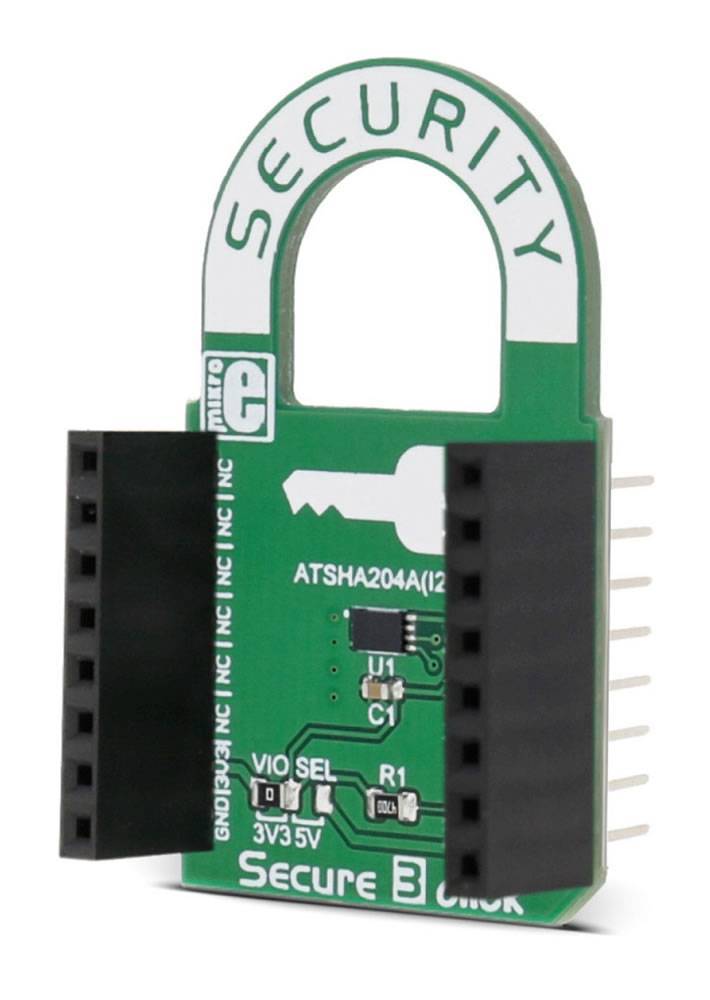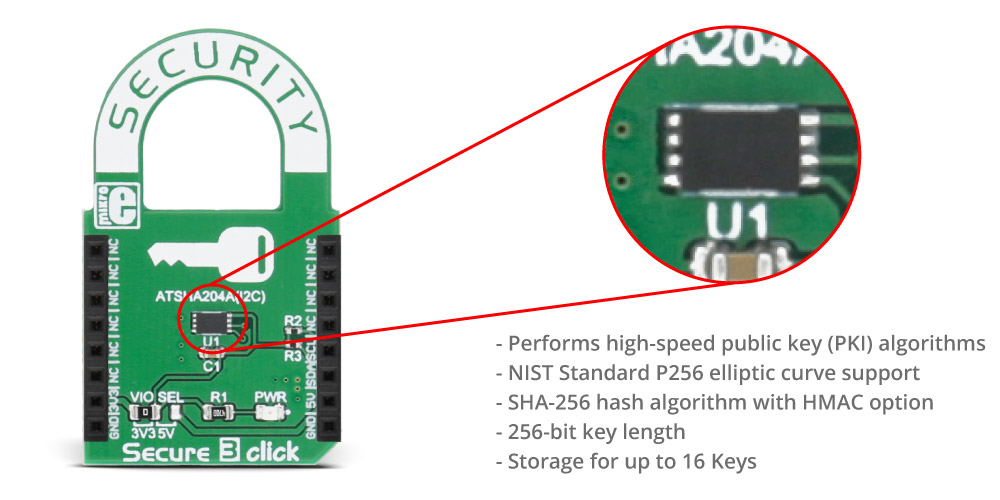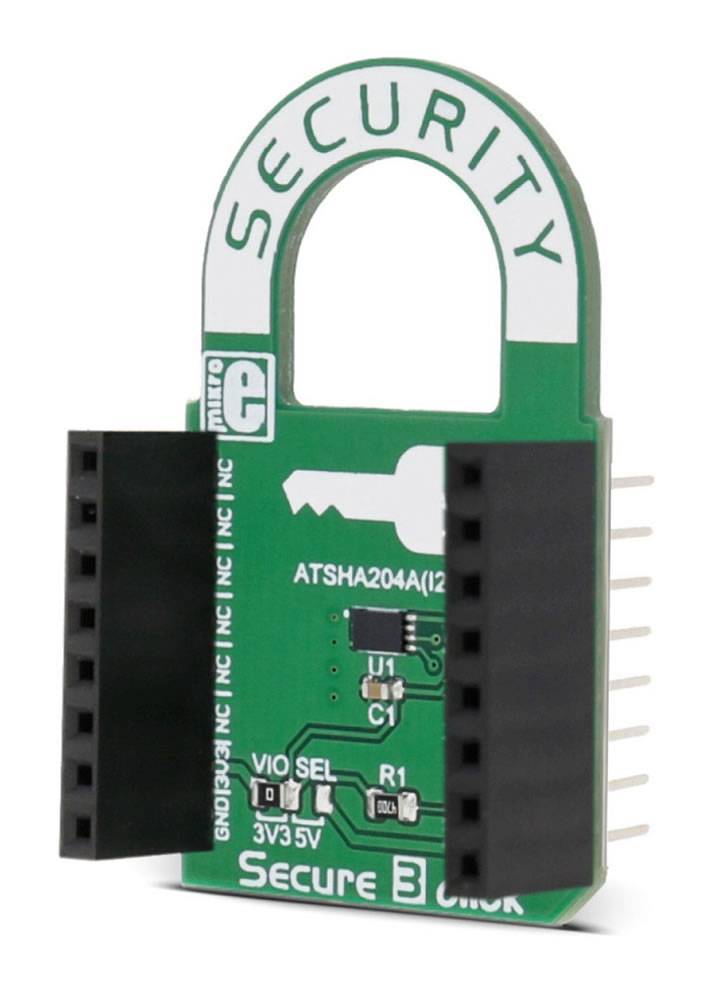
Overview
The Secure 3 Click Board™ carries the ATSHA204A, a cryptographic coprocessor with secure hardware-based key storage from Microchip. The Click Board™ is designed to run on either 3.3V or 5V power supply. Secure 3 Click Board™ communicates with the target microcontroller over an I2C interface.
NOTE: The Secure 3 Click Board™ comes with stacking headers which allow you to combine it with other Click Boards™ more easily by using just one mikroBUS socket.
Downloads
The Secure 3 Click Board™ carries the ATSHA204A, a cryptographic coprocessor with secure hardware-based key storage from Microchip. The click is designed to run on either 3.3V or 5V power supply. The Secure 3 Click Board™ communicates with the target microcontroller over an I2C interface.
It is ideal to use for:
- Secure download and boot - authentication and protect code in-transit
- Ecosystem control - ensure only OEM/licensed nodes and accessories work
- Anti-cloning - prevent building with identical BOM or stolen code
- Message security - authentication, message integrity, and confidentiality of network nodes (IoT)
NOTE: The Secure 3 Click Board™ comes with stacking headers which allow you to combine it with other clicks more easily by using just one mikroBUS™ socket.
ATSHA204A Features
The ATSHA204A is a member of the Microchip CryptoAuthentication™ family of high-security hardware authentication devices, which uses Secure Hash Algorithm (SHA-256) with 256-bit key length, message authentication code (MAC) and hash-based message authentication code (HMAC) options. It has a flexible command set that allows use in many applications.

The ATSHA204A device includes an Electrically Erasable Programmable Read-Only Memory (EEPROM) array that can be used for key storage, miscellaneous read/write data, read-only, secret data, consumption logging, and security configuration. Access to the various sections of memory can be restricted in a variety of ways, and the configuration can then be locked to prevent changes.
SPECIFICATIONS
| Type | Encryption |
| Applications | The Secure 3 Click Board™ can be used for the storage of certificates, miscellaneous read/write, read-only or secret data, consumption logging, and security configurations |
| On-board modules | ATSHA204A - a cryptographic coprocessor with secure hardware-based key storage |
| Key Features | Superior SHA-256 hash algorithm with 256-bit key length, message authentication code (MAC) and hash-based message authentication code (HMAC) options, storage for up to sixteen keys |
| Interface | I2C |
| Compatibility | mikroBUS |
| Click board size | M (42.9 x 25.4 mm) |
| Input Voltage | 3.3V or 5V |
PINOUT DIAGRAM
This table shows how the pinout of the Secure 3 Click Board™ corresponds to the pinout on the mikroBUS™ socket (the latter shown in the two middle columns).
| Notes | Pin |  |
Pin | Notes | |||
|---|---|---|---|---|---|---|---|
| NC | 1 | AN | PWM | 16 | NC | ||
| NC | 2 | RST | INT | 15 | NC | ||
| NC | 3 | CS | TX | 14 | NC | ||
| NC | 4 | SCK | RX | 13 | NC | ||
| NC | 5 | MISO | SCL | 12 | SCL | I2C clock | |
| NC | 6 | MOSI | SDA | 11 | SDA | I2C data | |
| Power supply | +3.3V | 7 | 3.3V | 5V | 10 | +5V | Power supply |
| Ground | GND | 8 | GND | GND | 9 | GND | Ground |
JUMPERS AND SETTINGS
| Designator | Name | Default Position | Default Option | Description |
|---|---|---|---|---|
| JP1 | VIO SEL. | Left | 3V3 | Power Supply Voltage Selection 3V3/5V, left position 3V3, right position 5V |
| General Information | |
|---|---|
Part Number (SKU) |
MIKROE-2761
|
Manufacturer |
|
| Physical and Mechanical | |
Weight |
0.02 kg
|
| Other | |
Country of Origin |
|
HS Code Customs Tariff code
|
|
EAN |
8606018711505
|
Warranty |
|
Frequently Asked Questions
Have a Question?
Be the first to ask a question about this.

